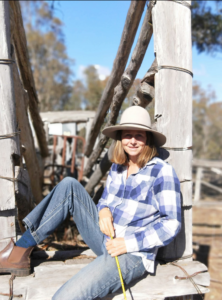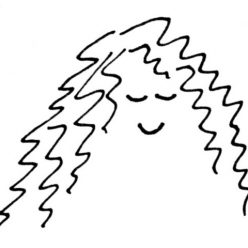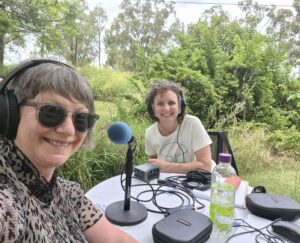“I love the outdoors. It gives me a peacefulness.”

This is the transcript from Season 2, Episode 7 of the Outdoors is my Therapy Podcast with my friend Tania Bertram.
Finding Peacefulness in Nature
Kathryn: Hello and welcome back to The Outdoors is My Therapy podcast. I’m your host, Kathryn Walton. This is series two and in each episode you’ll get to meet one of my friends who’ll share what inspires them about the outdoors. Each episode is just a few minutes long, like a little snack of information and inspiration that feeds your mind and your heart and reconnects you with the therapeutic benefits of the outdoor world.
As humans, we understand the world through our senses. Your senses provide you with opportunities to interact with your environment and with other people – a way of communicating and connecting, a bit like an interface to use “computer speak”. Your senses receive and then send information to your brain about where you are in space and time.
Signals are received by your senses from all around you. They’re sent through your nervous system where they’re processed and interpreted, and like all good communication, your brain then sends messages back through your body directing your next actions.
Most of the time your senses are working without you even realising. There are sights and sounds and smells that you’re not conscious of even though they’re there most of the time. Sometimes your brain will alert you to something like a dreadful smell, which is your natural protective mechanism kicking into gear, telling you to stay away because there’s something rotten, there’s something dangerous, something that could hurt you nearby.You might have also noticed the waft of a delicious veggie curry coming down the hallway at work, alerting you to the fact that it’s lunchtime and you really do feel quite hungry and need to eat.
Sights, sounds, smells, tastes and touches are all around you. It would be pretty overwhelming if you were conscious of all of them all of the time so how amazing is it that humans have developed a really clever filtering system so that you can be automatically alerted to danger as needed without having to waste your precious energy on, well, on things that you don’t need to be constantly conscious of.
But as always, there is a downside to this filtering mechanism. In an effort to optimise energy and attention towards danger and risk, you are probably missing out on some of the good stuff in life too.
When you intentionally engage your senses in the world around you, you open up windows of opportunity to experience peace and calm. There are infinite ways that you can do this in nature, and the most simple way is to step outside and look around you. Notice what your eyes are seeing. Notice the textures and the colours around you. Notice the sounds. Breathe in and notice the aromas. Stop, pause, take in the moment. Even for just a moment.
Our guest today speaks about her experience of doing this in a very special nature space where she lives. In fact, it was the very same space where we recorded this conversation. Tania Bertram loves the outdoors and has built a lifestyle around those aspects of nature that she loves the most and that bring her a sense of peace and calm in the midst of life’s stresses. Tania was one of our Outdoors is my Therapy Ambassadors when we launched in 2020, and she’s previously shared a story on my blog about her travels around Australia with two young children.
After you’ve listened to this episode, you might like to click on the link in the show notes to have a read of her story and be inspired. But for now, meet my friend Tania.
Hello Tania. Welcome to the podcast.
Tania: Thank you Kathryn. Nice to be here.
Kathryn: I’d love to hear from you what inspires you about the outdoors?
Tania: I love the outdoors. It gives me a peacefulness. Uh, I love looking at all the, the animals. listening to the birds. Walking down this morning I had a 360 degree hearing of birds. Looking at the trees, the colours, the bark, so much, um, so much interest in the bark itself. It’s just amazing. So it makes me stop and pause and have a look around, take in the moment.
Kathryn: Tania, do you have a favourite space in nature?
Tania: My favourite space recently is just sitting by the creek with the, the grass around me, the trees above me, uh, nature all around. So I’d say anywhere that’s, just outside and quiet. Really, really does. It does feel good.
Kathryn: And you’re really lucky where you live. You’ve got a beautiful creek and the 360 degree views and, and have that 360 degree sound of the birds as well.
Tania: It is, it’s an ideal spot. I’m so glad we found it. It was. It was just at a right time that, um, we could come down here and, and really appreciate it. And I do appreciate it. I, I come and camp, by myself and just look at the stars at night and listen to the wildlife around me. It, it is such a special place, very fortunate.
Kathryn: And we’re very fortunate today to be sharing it with you as well, sitting down by the creek while we’re recording this episode. So thank you very much for your generosity in, in sharing such a beautiful space with us, Tania.
Tania: Oh, it, it is been a pleasure having you. This perfect space has made even better with your company. Thank you.
Kathryn: Thanks for tuning into The Outdoors is My Therapy podcast. We hope you feel inspired to connect with the outdoors no matter how big or small your adventures might be. If you’re looking for more inspiration or you’d like to connect with others in the outdoors is my therapy community, check the show notes for all the links.
You can listen to the episode “Finding Peacefulness in Nature” here:
LINKS
Contact Kathryn via her website
Grab your free Guide to a Perfect Nature Escape Day when you subscribe to the Grounded Inspiration newsletter (limited time)
Read Tania’s blog post “Family Adventures: Tania’s Story of Travel Around Australia”
Join the Outdoors is my Therapy Facebook Group
Music by Twisterium from Pixabay
Discovering mountain biking as life’s ultimate parallel universe in her middle age,  Kathryn Walton shares information and reflections in Daisy Spoke that connect, inspire and self-empower women to make healthy choices for themselves. She integrates her love of physical exercise, family, nature, gardening and creative arts with her professional background in mental health social work to facilitate change with individuals, groups and communities of women who are committed to living life to the full.
Kathryn Walton shares information and reflections in Daisy Spoke that connect, inspire and self-empower women to make healthy choices for themselves. She integrates her love of physical exercise, family, nature, gardening and creative arts with her professional background in mental health social work to facilitate change with individuals, groups and communities of women who are committed to living life to the full.
